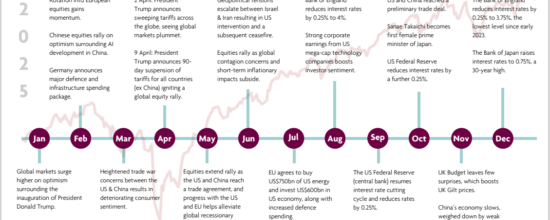Market Update: Concerns over interest rates weigh on US stocks
To download the PDF click here.
It’s been a tough month for markets after fears US interest rates will stay higher for longer.
Despite an upbeat third-quarter earnings season, US stocks dipped after investor sentiment was dented by worries about interest rates. Even though some of the big names in tech showed solid growth, markets fell amid concerns that a robust US economy may mean interest rates have to stay higher for longer. These fears have also driven a sharp sell-off in bonds.
The US Federal Reserve (Fed) is hoping higher rates will encourage saving and slow business expansion to cool the economy and reduce inflation. Meanwhile, the escalating conflict in the Middle East has caused a spike in crude oil prices but has so far had little impact on stock and bond markets.
US inflation was higher than forecast in September, adding more pressure on consumers. The Consumer Price Index rose 3.7% for the 12 months ending September, the same rate that was recorded in August. Core inflation – which strips out volatile food and energy prices – edged down from 4.3% to 4.1%.
Despite high interest rates, the US economy remains robust, expanding by 4.9% in the three months to September. Over 336,000 jobs were added last month, almost double the forecast. Even though prices are rising, American consumers are showing no signs of pulling back on their spending, with retail sales rising by 0.7% in September.
UK inflation remains sticky
Hotter-than-expected UK inflation dragged stocks down over fears the Bank of England may have to keep interest rates higher for longer. Headline consumer price inflation held firm at 6.7% in September. Even though inflation failed to budge, it is still down from its peak of over 11% a year ago. Food price inflation remains high but is coming down, falling from 13.6% in August to 12.2% in September.
Average pay growth rose above inflation for the first time in nearly two years, in a sign the cost of living crisis may be starting to ease. Regular pay, excluding bonuses, rose 7.8% in the three months to August, slightly down from the previous month’s 7.9%.
European bonds rally and Asian stocks rise
European government bonds rallied after eurozone inflation dropped in September to its lowest level in two years, which takes the pressure off the European Central Bank to hike interest rates. The annual rate of inflation for the region was 4.3% in September, down from 5.2% the previous month. However, there are fears higher energy and wage costs could keep inflation above target for longer than hoped.
The ECB warned that the region’s economy remains weak after pausing interest rate hikes for the first time in more than a year. Concerns are mounting about the impact of rate hikes on Europe’s economies, with fears of a possible recession growing, particularly given the downturn in Germany.
Asian stocks rose after China’s government announced fresh stimulus plans for the country’s strained economy, which are designed to boost growth next year. However, we believe that China’s GDP growth will slow and economic challenges will persist.
Figure 1: GDP (quarterly change, %)
The US economy has been surprisingly robust over the past few quarters, while the pace of growth in the UK and EU has been weaker.



